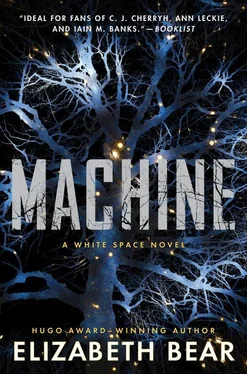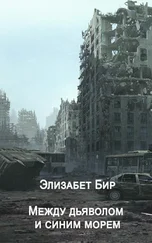I made my way back to Casualty, stopping to help injured people along the way. I left the patients still in rooms alone unless there was a crisis: they were as safe where they were as they could be anywhere, and their own care teams would have the relevant ayatanas.
And the hospital staff, once the initial confusion settled, started pulling together and cooperating with surprising efficiency. We couldn’t communicate complicated concepts, but we knew our jobs. And with long practice, you get a sense of when somebody is going to ask for a hemostat.
Casualty—the Emergency Department—had been nearly vacant and understaffed since the quarantine went into effect, because there was nobody coming in. Now it was a mob scene. And a mob scene under emergency lighting—at least the emergency lighting was working, here—in zero g, with people clinging to the deck with mag boots (like me) or zipping around, their trajectories narrowly avoiding collisions with one another, or occasionally not avoiding those collisions at all. I ducked under a cloud of drifting feathers from one such incident and made my way toward the admin desk, looking for somebody to tell me where I could be most useful.
My exo was at seventy percent, and I was sore but not in terrible pain. It wouldn’t have mattered if I was, under the current circumstances.
A team of three guiding one of the new grav stretchers sailed in alongside me. They were all suited, using their jets to navigate and push. The stretcher’s grav technology maintained its attitude with respect to the deck despite the lack of rotational acceleration. I was impressed. I hadn’t known they did that.
One of the medics pushing the stretcher noticed me standing there and squeaked demandingly through nasal slits. I jumped out of the way. It hissed like a deflating balloon and wrapped a suit-clad tentacle with a spatulate, arrowlike end around my wrist, tugging more or less gently.
It squeaked again.
The patient needs assistance, Sally said.
I glanced down at myself. My suit was covered in Well knows what, and nothing about my person was scrubbed and sterile. But it had picked up my identification codes from my fox, and there on my breast was my name in several sets of symbols—and my specialty.
Trauma doctor.
I stepped up to the stretcher and leaned in.
It was bad.
I wasn’t sure what species the patient was, but they bled the same hemoglobin pigment as me. I assumed that the rattling swell and release of atmosphere through spiracles into the tube-like body was desperate respiration: blood loss or pain. Two of the medics were applying manual pressure to savage-looking wounds. I didn’t need an ayatana to know the patient was bleeding to death.
I might need that ayatana to stop it from happening.
The patient made noises and gestures of dismay and distress that I didn’t need a translator to understand. They were probably feeling exactly as I would have felt, had our positions been reversed. They looked to have lost several pieces of their body: part of a locomotion limb, and an upper-body manipulator. The edges had the ragged look of an industrial accident, not the neat severing of a decomp door. The patient was wearing a maintenance uniform, and I imagined it must have been operating a piece of heavy equipment when the gravity went off. A floor-polisher or loader or something worse.
I couldn’t even request a surgical room. By the time I made myself understood, the patient would have bled to death.
I wanted to stick this patient in a cryo tank and wait for a specialist. I didn’t even know what meds I could give it for pain without killing it. I—
It was as if I weren’t in the hospital at all, but on a rescue mission outside somewhere, unable to communicate well and with only my own crew for support.
Wait.
Wait! Sally! Can you tell me what this syster is, and what I can give it for pain and shock? Does it do shock? And can you reach its fox and tune the pain down? The automatic response doesn’t seem to be working.
She read me a list of medications and a synthetic transfusion base as we were guiding the patient into a treatment bay. Then my next problem became finding a way to communicate those requirements to the pharmacy. I had handed back all the datapads I’d borrowed along the way… but I still had the reader I’d stowed in my thigh pocket. It was inside the suit, but I wiggled it out, inputted Sally’s list, and handed it to the syster with the lowest rank insignia—which was not the one with the tentacles.
This syster wasn’t wearing a full suit, just a harness and mask. It stared at me like the last cat I tried to teach algebra to.
I mimed giving an injection and pointed in the general direction of the pharmacy. The tech—which looked like a very alert feather duster with tufted owl ears and plumed moth antennae—focused all its sensory apparatus on me for one tense moment. Then it tipped down at the reader, back up at me—and whisked away in a puff of reaction jets.
I mimed hand-washing to one of the two remaining medics—both of whom were fully engaged in keeping pressure on the patient’s injuries—and sprinted with ringing magnets and aching knees across to a disinfection booth. I climbed in, suit and all, and let it blast me.
The decon stations were near the private unit I’d sneaked into the previous dia. I found myself glowering at the closed doors while my suit was rinsed and flash-dried. Why weren’t those staff out here helping?
The moment of rage was washed away by a flood of gratitude toward the rest of the hospital staff. Here we all were, side by side, up to our elbows in a dozen colors of gore. They were rewarding my faith on this terrible dia.
I’ve said that I’ve never been somebody who had faith. Not in the religious sense, and not in the secular sense of unequivocal reliance on the trueness of some premise or person. Not the way some people do. Except for my job, and my community.
And in that moment, I felt a faith and a connection to my community and their purpose that I imagine equaled any religious epiphany in its intensity. I was a part of something, and the thing I was a part of served a mission and a purpose that mattered as much as anything can matter in a vast and uncaring universe.
This was where I belonged, and this was what I ought to be doing.
Take that, Alessi.
My ex-wife used to tell me that the problem with our marriage was that I didn’t believe in anyone or anything. In retrospect, I had come to believe that her actual problem was that I hadn’t believed in her.
For the first time, I found myself wondering whose failing that had been.
_____
The nature of battlefield epiphanies is that you don’t have the time to appreciate how profound they are—or are not—at the time. Thirty standard seconds later, I was back in the treatment bay. I held my scrubbed hands out in that weird broken-elbowed way that hospital people instinctively know to avoid, no matter what appendage is being dangled awkwardly away from contaminated surfaces. I wasn’t sure why I was bothering; there was literally nothing sterile about these circumstances.
I guess points for trying?
Staff were administering the meds Sally had recommended when I returned. They acted fast. The patient didn’t lose consciousness, but their pain-tense body relaxed against the stretcher. Beads of what I assumed was sweat dewed grayish skin. The stentorian panting softened. They were getting oxygen now. Tourniquets had been applied to the wounded limbs so I could work without groping through a sea of blood. That had to have been contributing to the pain: tourniquets hurt . Somebody had draped our makeshift surgical field.
Читать дальше












